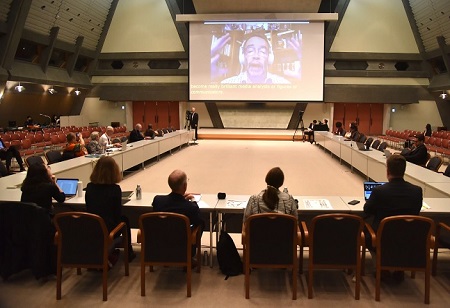Elon University leaders have coordinated the creation of a statement of principles to direct higher education institutions as they prepare humanity for the revolution brought about by this quickly developing and ground-breaking technology. Artificial intelligence is expanding its impact on all facets of life. President Connie Ledoux Book, Elon scholar-in-residence Lee Rainie, and Professor Divina Frau-Meigs of the Sorbonne Nouvelle University in Paris co-authored the declaration, which has received support from over 140 leaders and academics in higher education from over 40 different countries. In Kyoto, Japan, the authors attended the 18th annual Internet Governance Forum with other academics. They facilitated a debate on the variety of ways higher education institutions may foster artificial intelligence literacy and make a commitment to acting in the interests of society as these technologies advance.
The statement's six guiding principles, according to Book, represent a plea for the higher education sector to participate actively in the creation and regulation of AI. "The statement provides a framework for leaders at colleges and universities around the world as they develop strategies to meet the challenges of today and tomorrow", Book stated during the event, which drew delegates from all around the world both in-person and online. The declaration is being modified by the faculty at Elon University as they develop AI policy and new teaching and learning strategies".
The declaration calls on the higher education sector, not only those in conventional technical sectors, to actively participate in the creation of AI governance mechanisms. These mechanisms should be developed by a variety of stakeholders. The declaration adds, "Educators in all fields are well suited to provide intellectual and ethical guidance, carry out critical research, serve as reliable watchdogs, and be advocates for students, teachers, and society".
Rainie joined Elon this year as scholar-in-residence after two decades of working as a partner to Elon’s Imagining the Internet Center as director of internet and technology research. At Monday’s session at the Kyoto International Convention Center, he explained that the six principles bring time-tested truths to artificial intelligence and are essential for maintaining human rights, human autonomy, and human dignity.
“Clearly, we are at a singular moment now as AI spreads through our lives,” Rainie said. “In the past, tools and machines were created to enhance or surpass the physical capacities of humans. The advent of AI brings technologies that enhance or surpass our cognitive capacities”. As he joins Elon, Rainie begins a research effort to gather data in a survey of global experts and a survey of the general public in the United States to explore the views of both groups about how the benefits and harms of AI may unfold in the years to come. That work, which will be released in early 2024, builds upon the decades of work of the Imagining the Internet Center to catalog the insights of hundreds of experts about how the digital revolution impacts humanity.
Rainie noted that past surveys have generated a wide range of answers to questions about the digital revolution, but there is a universal purpose that can be seen driving those answers. “They want us to think together to devise solutions that yield the greatest possible achievements with the least possible pain,” Rainie said.
With the introduction of new generative AI tools such as ChatGPT in late 2022 and the increasing integration of AI technologies into a broader range of platforms, discussion around its long-term impact has exploded. Given the increasing complexity of AI systems and the newness of the technology, those discussions have often fostered panic among many in the population.
“As researchers, we have to resist the panic, the current panic about AI systems and the fact they might produce superintelligence that is more intelligent than us”, said Frau-Meigs, who serves as the UNESCO chair for Savoir-Devenir in sustainable digital development. “We need to lift fear and anxiety. We as universities have to come up with solutions for learners worldwide”.
Frau-Meigs said it is important to promote media and information literacy first to create a familiarity with concepts and issues that allow larger segments of the public to move on to AI literacy. “We want to leave a space for understanding and for adoption”, she said.

